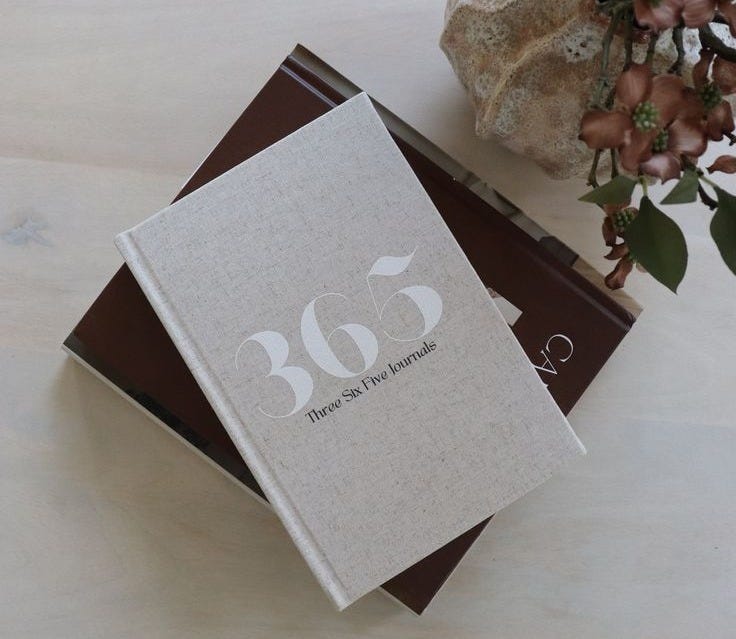I was listening to a Mel Robbins podcast featuring Dr. Ethan Kross, and he said something that really stuck with me,
Journaling is the most effective tool for managing anxiety, yet it’s also the most underused… because it takes effort.
That hit home. We’re all searching for ways to feel better - to manage our emotions, our stress, our anxiety - but when we’re actually faced with our thoughts, it can feel overwhelming. Sometimes we shut down. Sometimes we avoid. I’ve been there too.
That’s exactly why we designed 365 Journals the way we did - combining guided prompts with breathwork and mindfulness tools to help you stay grounded when uncomfortable emotions come up. Because journaling shouldn’t feel intimidating; it should feel supportive.
And if you’ve ever opened your journal, stared at the blank page, and thought, “I don’t even know where to start,” - You might like to hear that you’re not alone. It’s one of the most common things we hear actually. Most of us overthink journaling - Am I doing it right? Should I write every day? Does what I’m saying even make sense?
But journaling was never meant to be perfect. It’s meant to be honest.
When you drop the pressure, journaling stops feeling like another “to-do” and starts feeling like what it’s always been - a place to come home to yourself.
So, here’s some ways to make that mental shift and think of journaling as a spa for your brain rather than a chore.
Stop trying to “do it right” - There’s no rulebook for journaling. It’s not about perfect sentences or polished reflections - it’s about honesty.
Think of journaling as talking to a friend who truly listens. Once you stop trying to make your words sound good, they’ll start sounding true.
Try this: Instead of asking, “What should I write about?” ask, “What do I need to get out of my head right now?”
Don’t force a daily routine - You don’t have to write every single day to benefit from journaling. Research shows that even writing a few times a week can help reduce stress and improve emotional clarity. Keep your journal somewhere visible and open to a blank page. When something’s on your mind, pause and write - even if it’s just for two minutes.
The key is consistency in intention, not in schedule.
Start small, one line is enough - Not every entry needs to be long or deep. Some days, a single sentence like “I don’t know how I feel today” is all you need. Every word you write is a small act of self-awareness and that’s where healing begins.
Write like no one will ever read it -If you’ve ever held back because you were worried someone might find your journal write, rip and throw away the page. That in itself is a pretty good release. It’s a way of saying “This is no longer my story” Tear out the page when you’re done, burn it, or keep it sealed - what matters is that you let it out of your body and onto the page.
But the freedom to write honestly comes from knowing this is your private space.
Write with the intention of release, not record-keeping.
Be curious, not critical - The goal isn’t to fix yourself, it’s to understand yourself. Judgment shuts you down; curiosity opens you up.
When you write, trade “Why am I like this?” for “What might this be trying to teach me?”
End your entries with: “I understand myself a little more today because…”
Let your mood lead - Not every journal session has to look the same. Some days might call for gratitude lists, others for letters you’ll never send. Let your emotions choose the page.
Tip: Try color-coding entries - blue for reflection, yellow for gratitude, red for release. It helps you track your emotions without labeling them as “good” or “bad.”
Shift from productivity to presence - You don’t need to “journal to improve.” You just need to show up. You’re not writing to achieve - you’re writing to be present.
Take a deep breath before you start and remind yourself: “This is my moment to listen to me.”
Even five honest minutes can shift your entire day.
Make it a ritual, not a task - Turn journaling into something that feels safe and comforting. Light a candle, make tea, play soft music, or sit by a window. When you create a soothing environment, your mind learns that journaling is a time for calm, not pressure.
Let go of having all the answers - Journaling isn’t about fixing every problem - it’s about holding space for what’s unfolding. Some pages will feel messy or incomplete. That’s okay. That’s how healing often looks - imperfect, evolving, and deeply human.
Celebrate showing up - Even if you only write two sentences - it counts.
You showed up for yourself. You created space for your thoughts to exist.
That alone is a quiet kind of courage.
There’s no wrong way to meet yourself on the page.
Your journal isn’t a productivity tool - it’s a safe space to reconnect with your truth. It’s where you can be messy, confused, honest, and human without judgment.
So the next time you sit down to write, don’t worry about doing it “right.” Just start. Let the page hold what you’ve been holding alone.
The 365 Days of Self-Discovery Journal was designed to help you explore, reflect, and heal with ease - through guided prompts, affirmations, and space to just be.



